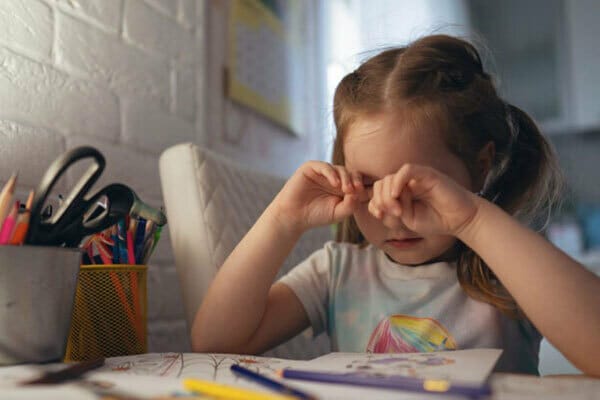Every day we rely on our senses to help us navigate the world. One of the senses that we rely on most is our visual system. We look at the clock, we read an email, we step up and down curbs, and avoid objects as we walk down the sidewalk. We drive down the road, observe our surroundings, and adjust our movements in relation to how other vehicles are moving. That is a lot of information we are consistently taking in, sifting through, and processing every minute of the day! For most of us, our vision is an essential role in our everyday life, however our eyes are just the portals gathering the raw data from our environment. Vision is a collaboration of our eyes and our brain.
Visual processing refers to the intricate system responsible for our eyes ability to take in light, movement, and images. It includes the relay of information traveling to our brains and how we make sense of that information so that we can then respond to it. It is a system that many of us take for granted because of how well it functions! However, sometimes this system experiences breakdowns along the process that can be particularly impactful for children.
Visual processing in children
Imagine if we weren’t able to make sense of all of the information presented to our visual system, or tune out the extraneous visual background information we are presented with everyday. Children with visual processing difficulties can be overwhelmed before they start the day at the school. Schools expect children to have these underlying visual processing abilities from day one. According to the American Optometric Association, up to 80% of a child’s learning in school is through vision! (College of Optometrists in Vision Development, n.d) A child with visual processing difficulties may present as having difficulty with reading, writing, spelling, maneuvering the playground, playing sports, and in their peer relationships.

What are some signs of visual processing difficulties?
Vision difficulties can often be missed or overlooked because a child may not know how to explain what they are seeing or may not realize they are not seeing something the way they are “supposed to.” For example, a child who appears to have difficulty attending in the classroom may be described as having a “behavioral problem, when in fact their visual processing difficulties may be making it difficult to stay focused on an assignment. In another instance, a child may present as having reading difficulty, when they might actually have an undiagnosed visual processing disorder, where they are seeing double, making it difficult to read fluently. Below are commonly reported signs/symptoms of visual processing difficulties that may indicate the need for an evaluation.
- Letter reversals affecting handwriting legibility
- Rubbing eyes or squinting
- Headaches
- Odd positioning while writing
- Motion sickness & dizziness
- Difficulty attending
- Abnormal grasp on utensils
- Closing one eye
- Changing head position
- Spelling errors
- Difficulty reading
What can OT do to help?
If you are noticing any signs or symptoms of visual processing concerns, an occupational therapy evaluation and an optometric vision therapy assessment may be beneficial to identifying where the difficulties are originating from and in recommending therapeutic approaches to improve visual processing skills. Some therapeutic interventions may include:
- Reflex integration exercises
- Ocular motor and visual tracking exercises
- School accommodations and modifications to improve success
- Multi-sensory approaches to learning letters
- Activities to develop and integrate sensory processing
If you have any questions, please reach out to our office at (203) 874-5437, send us an email at [email protected] or use the “Ask the therapist” option on our website.
References:
- Clark, Jenny (2021). Addressing Visual Processing Deficits in Children with SPD. MedBridge. Addressing Visual Processing Deficits in Children With SPD | FOX Rehabilitation.™ https://foxrehab.medbridgeeducation.com/course-catalog/details/addressing-visual-processing-deficits-in-children-with-spd-recorded-webinar-jenny-clark/.
- College of Optometrists in Vision Development (n.d)Learning- Related Vision Problems, https://www.covd.org/page/learning.

